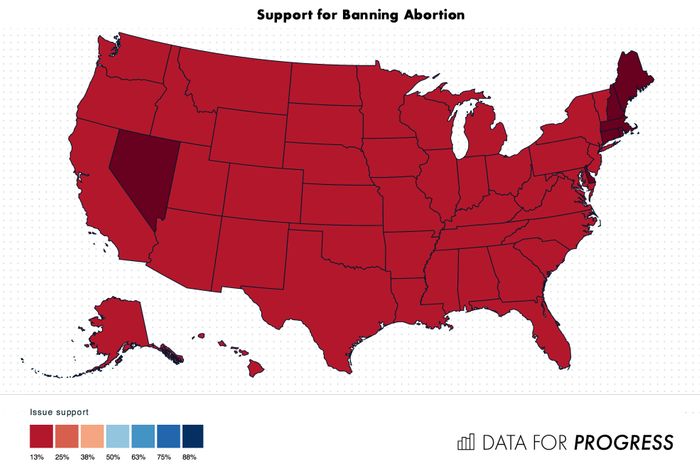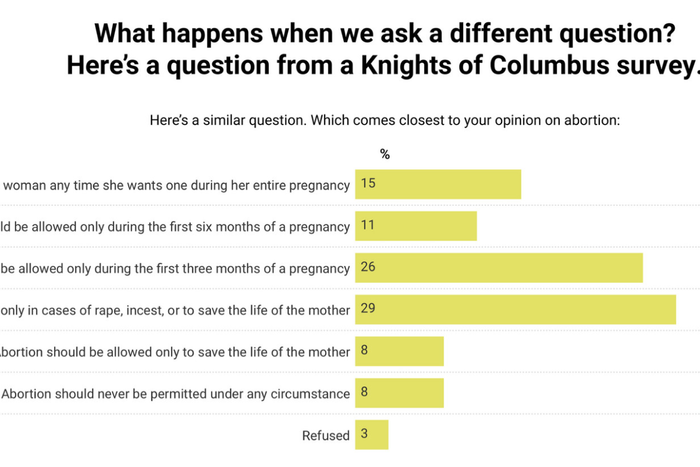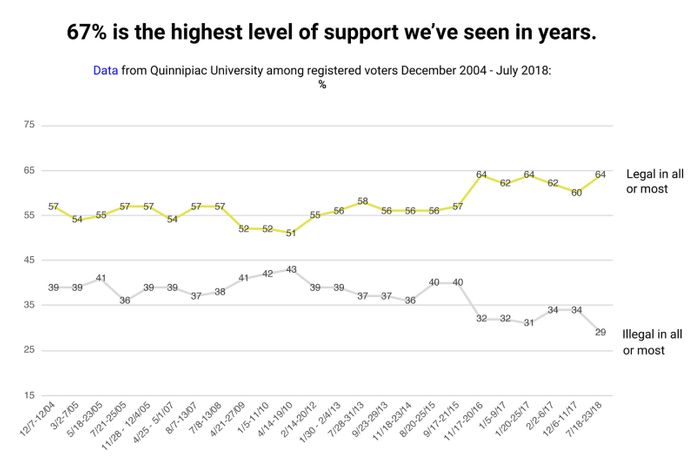
The government of Alabama just decided that providing an abortion to a 12-year-old girl who was raped by her father is a more serious crime than raping a 12-year-old girl.
On Wednesday, Governor Kay Ivey enacted the most restrictive abortion ban in the United States. Under its provisions, performing an abortion on someone who has been pregnant for more than six weeks is a Class A felony, carrying a minimum sentence of ten years in prison, no matter how said person became pregnant. Statutory rape and incest, meanwhile, remain Class C felonies — carrying a minimum prison sentence of just over one year.
Although some putatively “moderate” Republicans like Marco Rubio believe that the state should coerce victims of rape and incest into incubating their abusers’ fetuses, the vast majority of Americans do not. A 2018 Gallup poll found that 77 percent of voters felt abortion should be legal in such circumstances during the first trimester of pregnancy (while 52 percent said it should remains so in the last three months of a pregnancy). Even Pat Robertson — the Christian-fundamentalist televangelist who blamed “the gays” for 9/11 — said this week that Alabama’s abortion ban had “gone too far.”
Nevertheless, while Alabama’s decision to dispense with rape and incest exemptions is aberrant, it is far from alone in banning abortion in virtually all cases after the first six weeks of pregnancy — which is to say, before many women will even realize that they are pregnant.
Ohio, Georgia, Mississippi, and Kentucky all recently put such bans on their books, in the ostensible hope that the Supreme Court’s post-Kennedy majority will be willing to strike down Roe v. Wade. This flood of aggressive abortion restrictions, combined with America’s election of a virulently misogynist “pro-life” president in 2016, might give a casual political observer the impression that America is bitterly — and almost evenly — divided on reproductive rights and becoming more so all the time.
But this is false. There are some abortion-policy questions that do genuinely divide the American people along partisan lines. Most Republican voters support the ban on federal funding for abortion services in opinion polls, while a plurality of Democrats oppose it. And on issues regarding late-term abortions, Democratic legislators are often decidedly to the left of public opinion, particularly as measured by surveys that do not note that such procedures are exceedingly rare outside tragic circumstances.
But the notion that a fetus with a heartbeat is a person — and that the state should therefore treat aborting a pregnancy after six weeks as an act of murder — is an utterly fringe notion in American life. And this is true not merely at the federal level but also in every U.S. state. The progressive think tank Data for Progress recently applied national survey data on abortion from the 2016 American National Election Studies (the gold standard for opinion polling) to conventional demographic-modeling methods in order to estimate state-level support for a variety of abortion policies. It found that there is not a single state in the union where a majority of voters support “making abortion illegal in all circumstances.”
This is consistent with polling from the Public Religion Research Institute.
The Alabama GOP isn’t out of step with its own voters merely on the question of fetal personhood. This past July, an NBC News–Wall Street Journal survey asked respondents, “The Supreme Court’s 1973 Roe versus Wade decision established a woman’s constitutional right to an abortion, at least in the first three months of pregnancy. Would you like to see the Supreme Court completely overturn its Roe versus Wade decision, or not?”
Fifty-two percent of Republican voters chose “not.” This is broadly consistent with a contemporaneous poll by the firm PerryUndem, which found that 49 percent of self-identified Republicans — and 52 percent of Trump voters — said that they did not want the Supreme Court to overturn Roe.
While majoritarian opposition to legally enshrining “fetal personhood” — or eliminating a constitutional right to an abortion within the first trimester — is unambiguous, the defining characteristic of public opinion on abortion may be its malleability. Small changes in how policy questions are worded can yield vastly disparate results. In some cases, these disparities tell us less about the public’s views than a given pollster’s skills for eliciting the responses it desires.
But there is one method that both consistently produces more liberal responses on abortion policy — and which also seems methodologically appropriate, on the merits. On so-called moral issues such as abortion, voters often have difficulty distinguishing questions about their political views from inquiries into their personal ethics. For example, one can interpret “Should abortion be allowed in X circumstance?” as “Do you think it is right for someone to have an abortion in X circumstance?” — rather than as “Do you think the government should establish criminal penalties for doctors who provide abortions in X circumstance?” Thus to get an accurate sense of what voters actually want the government to do on issues of reproductive rights, it is best to foreground the fact that you are not asking about how individuals should behave but about how politicians should legislate.
And when the law is foregrounded, many voters turn out to be a lot more “pro-choice” than they believe themselves to be. For example, a recent survey commissioned by the Knights of Columbus found a majority of voters saying that their opinion on abortion was best described as either “abortion should be allowed only during the first three months of a pregnancy” or “abortions should only be allowed in cases of rape, incest, or to spare the life of the mother.” Only 11 percent said their view was best summarized as “abortion should be allowed during the first six months of a pregnancy.” These findings were then reported as showing majoritarian support for substantial new legal restrictions on abortion.
And yet when PerryUndem asked voters specifically whether they wanted their elected representatives to restrict abortion after the first trimester, opposition to the idea was overwhelming. Asked whether the government should “pass a new law” restricting abortion to the first three months of pregnancy, just 15 percent of respondents said yes — while 85 percent agreed that “it’s better if lawmakers stay out of this because every situation is different.”
This comports with a 2017 PerryUndem survey that asked, “Who should decide how far along in a pregnancy a woman can have an abortion?,” and then gave respondents a variety of options, including “the doctor,” “the medical profession,” “the woman,” “the Supreme Court,” “politicians in Congress,” and “politicians at the state level,” among others — then invited them to select as many of these authorities as they felt appropriate. Only 10 percent selected politicians; 16 percent picked the Supreme Court. The rest felt that this was not a matter for agents of the state to decide.
Even when the legal question is foregrounded more subtly — as in Quinnipiac’s polling, which asks whether abortion “should be legal or illegal in all or most cases” (as opposed to “should abortion be allowed in all or most cases”) — public opinion proves far more broadly permissive than the partisan debate would lead one to believe.
All of which is to say: It simply is not the case that red states are passing sweeping new abortion restrictions at the behest of “half the country” or even of a majority of Republican voters. Whatever their own moral intuitions, the vast majority of Americans do not believe that the government should focus its limited policymaking resources on curtailing or criminalizing the provision of abortion — let alone on coercing rape victims into delivering their abusers’ babies. Ordinary voters, conservative or otherwise, are not the authors of the GOP’s assault on reproductive rights. A well-funded, well-organized interest group is. The “pro-life” movement’s cause is an utterly fringe one. It does not owe its strength to mass popular appeal but to decades of organizing and to the intensity of its adherents’ passion for controlling the bodies of pregnant women.
Voter turnout is unusually low in American elections, and turnout in partisan primaries is even lower. Further, even among the voting public, the percentage of (effectively) pro-choice Republicans who pay close attention to events in their state legislatures and to the issue positions of candidates — and care enough about abortion to punish lawmakers who defy their preferences on the issue — is vanishingly small; certainly, far smaller than the percentage of pro-lifers who meet those criteria. As a result, the latter minority is dictating abortion policy in Republican-controlled states across the country.
Progressives cannot beat back the GOP’s assault on reproductive rights merely by “winning the argument” over abortion; in many respects, that argument is already won. America does not lack a pro-choice consensus; the pro-choice majority lacks the power to hold Republican lawmakers accountable to that consensus. Thus the fight for reproductive rights in the United States is inextricable from the struggle against the tyrannical rule of our nation’s far-right minority.








